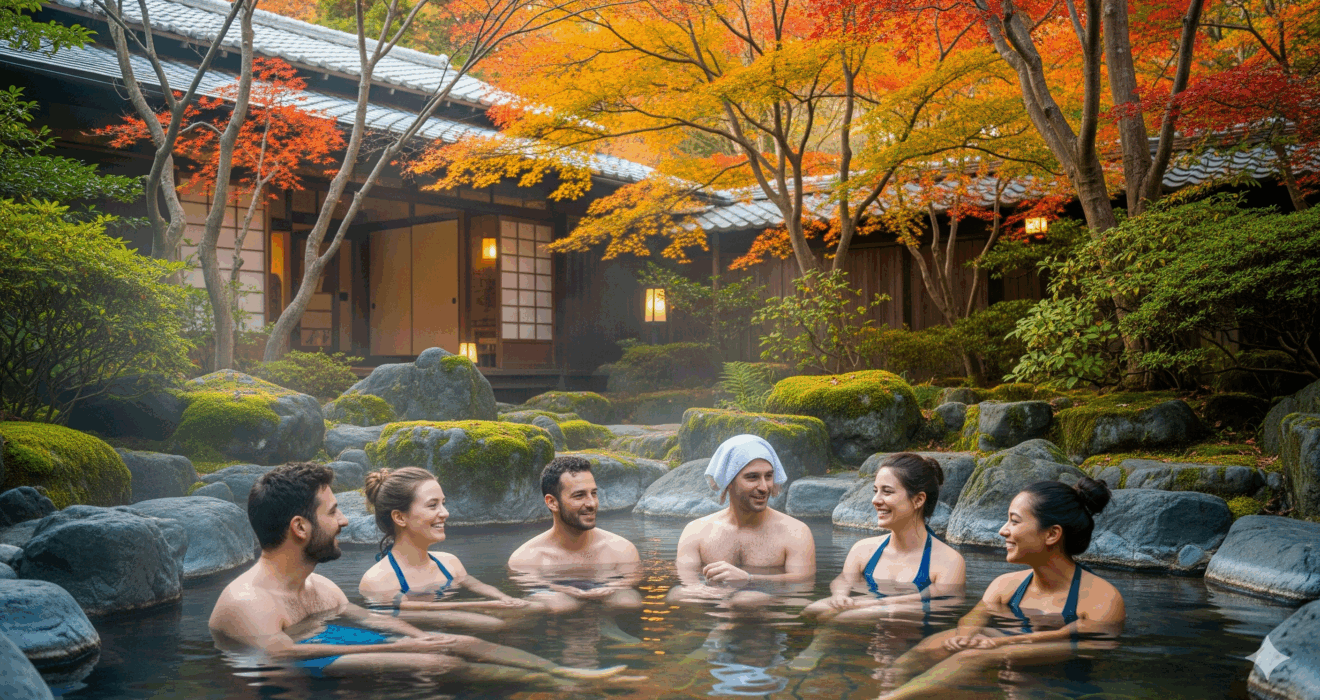Is it true that you can’t enter the pool or hot springs? Tattoo and Japanese rules

Some of you who are planning a trip to Japan are looking forward to the beautiful scenery, delicious food, and above all, the culture of Japan. Among them, isn’t the ‘hot spring’ that you want to experience in particular?
However, if you have a tattoo on your body, you may be worried, ‘I heard you can’t go to the hot springs, is that true?’ In conclusion, it is true that many facilities restrict the use of people with tattoos.
But don’t worry. In this article, we will explain in an easy-to-understand manner the situation in Japan and tips for enjoying hot springs to your heart’s content even if you have tattoos.
Is there a place in Japan where tattoos are not allowed?
Tattoos and tattoos may be refused entry to other facilities other than hot springs, and may be restricted. The main reason for this is the negative image of tattoos that remain deeply rooted in Japanese society.
Here, we will introduce some representative places where tattoos and tattoos are considered NG.
Hot springs, pools, beaches
Many hot springs and hotel pools limit the use of people with tattoos. In addition, some beaches also prohibit exposure of tattoos at the discretion of local governments and local ordinances, or beach administrators.
Fitness Club/Gym
Many big fitness clubs limit the membership of people with tattoos. This tendency is particularly noticeable in facilities with large public baths and shower rooms.
Luxury Restaurants and Hotels
Some fine restaurants and hotels may limit tattoo exposure as part of the dress code. Especially in places where the formal atmosphere is respected, you may be required to wear a long-sleeved shirt so that the tattoo is not visible.
Public stadiums (boat races, velodrome, etc.)
Even in public stadiums, tattoo exposure may be restricted. This is a measure to eliminate relationships with organized crime groups and to maintain sound management.
Even in America, it is common to not show tattoos in business or formal occasions. For example, in professions such as lawyers, bankers, and doctors, many people hide their tattoos with suits or long sleeves, especially when dealing with customers and patients.
Especially in religious and conservative communities, a negative view of tattoos remains.
With a similar tendency, society as a whole is considered a formal place where society as a whole is conservative and many other people are considered formal places.
That’s why some facilities are prohibited from showing tattoos.
Why does the tattoo (Irezumi) have a bad impression?
Why are tattoos, which are widely accepted overseas as fashion and self-expression, still have a negative image in Japan and are socially restricted? The reason is deeply rooted in Japan’s long history and unique culture.
History as a ‘tattoo punishment’ for a criminal
In Japan, the tattoo (Irezumi) was once used in the form of a ‘tattoo’ to indicate a sinner.
Over 150 years ago, criminals were punished for engraving specific patterns and letters on their arms and foreheads, and their tattoos became ‘social stigma.’
This punishment cannot be erased once it is put in, so that even after returning to society, the people around him can tell at a glance that he is a person who has committed a crime.
This historical background has established the negative image of ‘criminals’ and ‘anti-social forces’ about tattoos.
The connection with the yakuza
The reason why yakuza get tattoos is a special connotation in that society.
Tattoo first means a break from the general public. Once you get a tattoo, it will be difficult to get a general job or use public facilities such as hot springs and pools. This act shows the strong determination to not return to the general public.
Also, long-term painful tattoos are also a way to satisfy a man’s vanity and self-disclosure. Endurance of pain is a sign of patience and courage, and is an important factor in gaining position and trust within the group.
In addition, tattoos also act as symbols of intimidation. By showing the tattoo, which is the symbol of the yakuza, you can intimidate other humans and show their power and presence.
In this way, tattoos are not just decorations, they are important symbols to show the determination to live in a gang society and to show one’s own power.
For this reason, tattoos are considered to be a fear and a sense of intimidation, and public facilities such as hot springs and swimming pools can make other users feel at ease. In order to prevent troubles from happening, there are now a wide range of rules to uniformly refuse entry for people with tattoos.
Prohibition of the Meiji Era, which was regarded as ‘barbaric’
In the Meiji era, when Japan joined the international community, the government banned tattoos by law because of concern that tattoo culture would be regarded as ‘a barbaric custom’ by Western countries.
As a result, the tattoo has disappeared from the front stage of Japan and has become a culture that is inherited only by a limited number of people.
Because of these historical backgrounds, tattoos have come to be recognized as a ‘social negative aspect’ rather than just fashion.
Of course, in recent years, the perception of tattoos has changed, especially among the younger generation, and more and more people are enjoying it as ‘fashion and art.’ However, the current state of tattoo culture in Japan is that the historical prejudice has not completely disappeared.
Changes in the image of tattoos that are changing in Japan
In Japan, society’s perception of tattoos is changing, albeit little by little.
Differences in consciousness between generations
The idea of tattoos varies greatly from generation to generation. Among young people, more and more people are viewing tattoos positively as ‘fashion,’ ‘self-expression,’ and ‘art,’ partly due to the influence of overseas culture and SNS. In some surveys, many young people in Japan answered that ‘tattoo regulations should be relaxed.’
Changes in response in tourism
As the number of foreign tourists visiting Japan increases, the acceptance of tattoos is beginning to change. Since many foreign tourists are looking forward to hot springs and pools, the number of ‘tattoo friendly’ facilities that can be used even if you have a tattoo is increasing all over the country.
The Japan Tourism Agency has also sent notices to hotels and ryokans not to refuse bathing because they only have tattoos.
Of course, tattoos are not yet fully accepted by society as a whole. It is also true that some people have a negative view of tattoos, especially in public places. However, due to the influence of generational change and globalization, Japan’s way of thinking about tattoos is definitely shifting from ‘taboo’ to ‘one of various cultures.’
Still, I want to use hot springs and pools!
In recent years, with the increasing number of foreign tourists, more and more facilities are tolerant of tattoos. If you search the Internet with keywords such as ‘tattoo friendly hot spring’ or ‘tattoo OK hot spring’, you can find a site with a lot of information.
If you want to enjoy the hot springs most definitely, we recommend a private bath, a family bath, or a ryokan with an open-air bath in the guest room. These are not the same with other customers, and you can enjoy them without hesitation with only family and friends.
If you respect Japanese culture and make good use of these methods, you can fully enjoy Japanese hot springs and pools even if you have a tattoo. Please use this as a reference when planning your trip.

